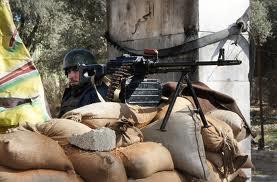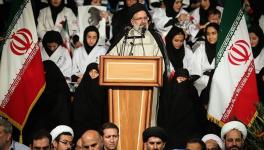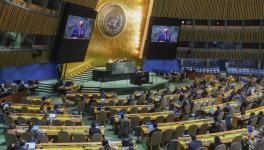Syria Chemical Weapons – Replay of Iraq's Dodgy Dossiers
The hypocrisy of the US and its allies is today matched with the complicity of the global mainstream media. Without producing any shred of evidence, the US and its allies are telling the world that they have conclusive evidence that it is the Assad regime that has conducted the chemical attack in Ghouta, a suburb of Damascus, killing an estimated 356 people. The US and France are still claiming that under “a right to protect”, they can now bomb Syria – kill more Syrians in order to protect them. This was Kerry's plea when he spoke to the press -- trust us, we know, so let us bomb Syria.
The UK has now dropped off from the list of the willing, after Cameron lost a vote in the House of Commons, with Labour and some of his own party members asking for “compelling evidence''.

One would have thought that after Iraq and the WMD fairy tales that the US and UK intelligence agencies had cooked up, the mainstream western media would be a little skeptical of claims that are not backed up with evidence. This does not seem to be the case. As of now, the voices of skeptic are few and far between, the dominant media narrative still parroting the new dodgy dossiers of the UK and the US intelligence agencies.
The evidence produced by the two sets of agencies are now available (here and here). The evidence is: a) YouTube videos, therefore it happened b) rebels could not have done it because they do not have the capability c) therefore it must be Assad d) we have classified further evidence that we cannot disclose. Based on this, “Our high confidence assessment is the strongest position that the US Intelligence Community can take short of confirmation”. In other words, not even a slam-dunk that George Tenet, the CIA Director had claimed for WMD's in Iraq.
The UK dossier is even more underwhelming and cites the same evidence. In other words, the case that the UK and the US have built rests almost entirely that their Al Qaeda affiliate pals in Syria do not have the capability of using chemical weapons.
It is farcical that both the US and the UK intelligence agencies claim that the rebels in Syria do not have the means to either manufacture or deliver chemical weapons.
The rebels have been using mortar and rockets on Syria and there are again enough videos on YouTube showing this. Threfore, they have the capability of delivering a chemical weapon strike using either mortar shells or rockets. So do they have the capability to manufacture chemical weapons?
A recent report filed by an AP stringer and another reporter in a newspaper has blown the claim that the rebels do not have chemical weapons sky-high. According to Dale Gavlak reporting for Mint Press News and Yahya Ababneh, the two reporters, the people in Ghouta are clear that the incident was triggered by Saudi supported rebels, who have been supplied such weapons by the Saudis. According to this report, these weapons were stored in tunnels and got triggered accidently. There is also some back-up evidence to this claim. The Syrian News Agency had reported that in the tunnels in Ghouta, they had found chemical weapons and also chemicals in containers with Saudi markings. They have also claimed that their soldiers have suffered from chemical attacks during this round of fighting. There are also reports of 4 Hezbollah fighters suffering from chemical weapon injuries being treated in Lebanon.

Even if we discard all this, it is difficult to believe that rebels have no access to chemical weapons. Chemical weapons are not difficult to make and can be manufactured with some knowledge of chemistry. In any case, the head of chemical weapons division in Syria, Major General Adnan Silu defected to the rebels in 2012. The rebels had earlier seized chlorine making facilities near Al Khanal, the site of the chemical attack that the UN team was originally investigating. There are reports from Turkey of Syrian rebels being found with Sarin, the highly toxic nerve gas and also similar reports from Iraq. The US intelligence agencies in the past have also claimed that Al Qaeda has chemical weapons capability. The UN human rights investigator Carla del Ponte had in May this year stated that the rebels had used Sarin in Syria.
It is difficult to see how in face of this amount of evidence we can believe that the Syrian rebels do not have the capability of using chemical weapons, unless as an act of faith. In any case, the rest of the world does not have this faith in the US and UK intelligence agencies, even if their citizens and media do.
There are other disturbing anomalies in the chemical attack scenario. Any chemical attack should see a lot of in situ evidence – people killed inside houses, dogs and other small animals dead in and around the scene. None of this is visible in the videos that have been uploaded. Neither is Sarin so clear as the agent, as some of the symptoms of Sarin – vomiting and defecation – is not evident. There is the possibility that it was the shelling that lead to chemical explosives in the possession of the rebels blowing up or even a chemical factory being bombed – by either side – leading to release of dangerous chemicals.
It appears very strange that Assad, very much on top at the moment, would risk a chemical weapons attack precisely when the UN inspectors were already in Damascus. They have enough fire power around Damascus to take out rebel positions without resorting to chemical weapons. The opposition has a far greater incentive to use such weapons, particularly as Obama has declared it a “red line” and therefore a means to drawing the US into the war in Syria.
The US has taken positions after the attack that border on the farcical. Even though the UN team is investigating an incident that took place 5 months back, the US claimed that 5 days would make any investigation useless and the world should instead rely on what the US claims it knows. Initially, it had said that Syria's unwillingness for allowing a UN probe was proof that the Assad regime was responsible. When it transpired that the UN had asked for access to the site of the incident only last Friday and the Syrian government had agreed the next day itself, the US started talking about "too little, too late".
With the domestic lobotomised media completely convinced of the US narrative, the next step was to launch a punitive strike on Syria. The US military is clear that it cannot fight another war in west Asia. But a punitive strike that degrades Syria's military capability has a number of positives. It weakens Syria and therefore the axis of resistance -- Iran, Hezbollah and Syria. It helps Israel to be even more militarily dominant in the region. Israel saw three major opponents in the Arab region. The major challenge was Egypt, tamed with Camp David accord, Iraq, helpfully taken out by the US. The only remaining Arab challenge is Syria, now engaged in a near civil war with Islamic fundamentalists backed by the NATO powers.
Israel has always been interested in disarming its opponents. While it itself possesses nuclear weapons, it is happy to have the US disarm all others in the region. Ariel Sharon had said just before the Iraq attack in 2003, “Iran, Libya and Syria should be stripped of weapons of mass destruction after Iraq. "These are irresponsible states, which must be disarmed of weapons of mass destruction.
If the rebels win in Syria, it creates a possible problem in the region, as the Islamic fundamentalists are difficult to control. The best course for the US, Israel and their NATO allies is to play a "balancing" role -- take out Assad's military assets if he is coming out on top and cutting off arms supplies to his opponents if they are gaining ground. This would keep Syria in a permanent state of war and suck in Hezbollah and Iran with minimum cost to the US, Israel and their NATO allies. A low cost war for the US, but a very high cost one to the Syrians. This is more or less what the US has been doing for the last two years, a war in which Syria bleeds but with little consequence for the US and its allies.
What has queered the pitch are the gains that Assad has made recently. It appears that the balance of forces has shifted decisively in favour of Assad. It is not that people have discovered new found love for him but that a bunch of Islamist fundamentalists with a taste for occasional cannibalism do not inspire a lot of confidence in the Syrian people.
The US wanted to strike quickly against Syria in the belief that a quick military strike without putting boots on the ground would not encounter too much resistance. The Russians would oppose, so would the Chinese. But they would not go to war with the US over Syria.
The problem is that the UN did go in for investigations and an otherwise docile Ban Ki Moon wanted time to complete the investigations. Time is a dangerous thing. It has led to second thoughts in lots of places. Voices are being raised regarding the legality of such an attack. The UK has pulled out now. The long held views of the US that international law is only for others is not going down as easily as it did when it bombed Serbia on Kosovo. The need for a fig leaf of legality is being asked by various actors, not the least the military. Worse, if the UN investigators come out with a report that raises doubts regarding Assad regime being the culprit, if would put a major spanner in the works.
It is ironical that chemical weapons is the bogey that the US is using in Syria. The US and the UK were fully complicit in Saddam's use of chemical weapons against Iran and its own citizens. They supplied with the technology, expertise and even battlefield intelligence of its use in their war against Iran. They also protected Iraq in the UN when Iran brought up the use of chemical weapons in the Security Council. The US and Israel have used chemical weapons a number of times recently. Depleted uranium weapons and white phosphorous used in Fallujah have resulted in rates of cancer that are higher than even in Hiroshima after the atom bomb. Israel used white phosphorus in Gaza in its last attack. But then, international law applies to the weak. For the strong, there is only the law of the jungle.
The immediate danger to Syria may have gone down a notch but only marginally. Without boots on the ground, protests against military strikes have been weak. Countries such as India seem to have given up any pretension of having a vision of what should govern international relations. All they can think of is how to keep their head down when decisions are being taken.
There is a possibility that the military strikes that were almost a done deal till a few days back has weakened somewhat. But every time this kind of hysteria is whipped up, the next round becomes easier. The play of limited military strikes gets more and more traction. And a next incident is only a matter of time. If Assad does not provide one, cooking up a new one is not too difficult. So military strikes -- under this plea or a future one - is still very much in the offing. Only a world revulsion against such unilateral Us action can turn the tide against such strikes. That is the challenge we all face -- how to make our voice heard.
Disclaimer:The views expressed here are the author's personal views, and do not necessarily represent the views of Newsclick
Get the latest reports & analysis with people's perspective on Protests, movements & deep analytical videos, discussions of the current affairs in your Telegram app. Subscribe to NewsClick's Telegram channel & get Real-Time updates on stories, as they get published on our website.
























